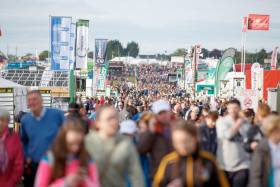Displaying items by tag: National Ploughing Championships
Try Out Angling At The National Ploughing Championships This Week
#Angling - Novice anglers are invited to try their hand at fishing at the upcoming National Ploughing Championships.
Inland Fisheries Ireland will attend the three days that kick off in Screggan near Tullamore, Co Offaly from tomorrow, Tuesday 18 September, with a fun fishing simulator suitable for all the family.
The simulator will be present at IFI stand within the Department of Communications, Climate Action and the Environment’s tent at the championships.
Fisheries officers will be on hand to answer questions from members of the public around best farming practice on waterways, and how to take up angling as a novice, as well to provide information and guidance around Ireland’s fish species and the aquatic environment.
There will also be aquariums with a range of coarse and game fish species on display.
“The participation of the public in the fisheries resource is vital in ensuring it is protected and enhanced in a sustainable manner for both the recreational and economic benefits it offers to communities nationwide,” says Suzanne Campion, IFI’s head of business development.
“We are looking forward to sharing insights into the fisheries resource, and the indigenous fish species that live within it, with both the general public and the farming community.”
Also exhibiting at the National Ploughing Championships this year are Leave No Trace Ireland and the Marine Institute’s Explorers Education Programme, who aim to highlight the impact of plastics in our oceans at their stand in the the Department of Community and Rural Affairs tent.
“A truckload of plastic waste finds its way into the ocean every minute of every day, and it is estimated that by 2050 there could be more plastic by weight than fish in the ocean unless behaviours change,” explains Maura Lyons, chief executive of Leave No Trace Ireland.
“Although we are all contributing to this worldwide epidemic, recent campaigns such as Say #No to Plastic have generated an amazing amount of supporters at community levels – particularly with children and families wanting to create change.”
With the research being completed in Ireland and around the world, results of plastics making their way into the ocean are showing a significant impact on the marine environment and animals.
Unprecedented levels of microscopic plastic particles were recently detected in an oceanic survey carried out by phytoplankton, biotoxin and oceanographic scientists from the Marine Institute.
From the larger plastics to clothes fibres from our washing machines all making their way into the ocean, visitors to the Leave No Trace/Explorers Education stand will get an opportunity to learn how long it takes for single-use plastic to break down, as well as receiving tips on how to go plastic free.
Those attending will also get to see live native marine species that are typically found in rock pools around the Irish coast including dogfish, plaice and starfish in the Explorers display boat.
“It is great to see an increased interest from children, schools, communities and businesses in Ireland that have already committed to reducing single-use plastics by offering alternatives for customers,” Lyons says. “These small changes can result in big impacts, which will help encourage a change in behaviours.”





























































